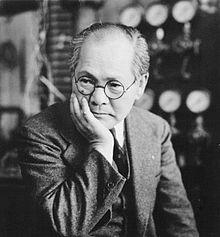Yoshio Nishina
Yoshio Nishina ( Japanese 仁科 芳 雄 , Nishina Yoshio ; born December 6, 1890 in Satoshō , Okayama Prefecture ; † January 10, 1951 ) was a Japanese physicist and science organizer.
Nishina studied electrical engineering at the Imperial University of Tokyo , where he graduated in 1918 and actually wanted to become an electrical engineer. As a member of the private research organization RIKEN (Institute for Chemical and Physical Research, founded in 1917) in Tokyo, he turned to physics.
In 1921 he was sent to Europe, where he stayed until 1928. He was there at the Cavendish Laboratory in Cambridge with Ernest Rutherford , at the University of Göttingen and in Copenhagen with Niels Bohr , with whom he became friends. It was there that he began his work with Oskar Klein in 1928 on the scattering of hard X-rays or gamma rays from free electrons , which led to the Klein-Nishina formula .
He then returned to Japan, where he dealt with elementary particle physics from cosmic rays and particle accelerators in his own laboratory at RIKEN, the Nishina Laboratory, founded in 1931. He made the new quantum mechanics known in Japan (after modern physics had already received a boost from Albert Einstein's two-month visit to Japan in 1922) and invited scientists such as Paul Dirac , Heisenberg and Bohr to Japan. The later Nobel Prize winners Shin'ichirō Tomonaga and Hideki Yukawa were among his students .
In the 1930s he also dealt with the then very current nuclear physics and led the construction of two cyclotrons completed in 1935 at the newly founded Institute for Nuclear Physics at RIKEN. During World War II he headed the nuclear energy or nuclear weapons program in Japan and after World War II he was President of RIKEN.
In 1944 he received the Asahi Prize , in 1946 the Imperial Order of Culture . A lunar crater is named after him and the Nishina Prize, which has been awarded since 1955 for exceptional achievements in atomic physics and its application .
literature
- Dong-Won Kim: Yoshio Nishina - Father of Modern Physics in Japan . Taylor and Francis, 2007, ISBN 978-0-7503-0755-0 .
Web links
- Literature by and about Yoshio Nishina in the catalog of the German National Library
| personal data | |
|---|---|
| SURNAME | Nishina, Yoshio |
| ALTERNATIVE NAMES | 仁科 芳 雄 (Japanese) |
| BRIEF DESCRIPTION | Japanese physicist |
| DATE OF BIRTH | December 6, 1890 |
| PLACE OF BIRTH | Satoshō, Okayama Prefecture |
| DATE OF DEATH | January 10, 1951 |

